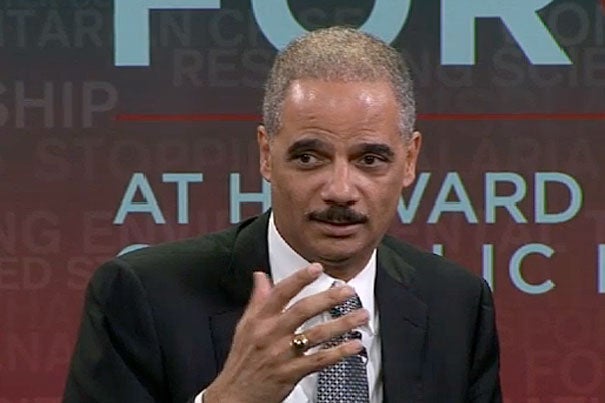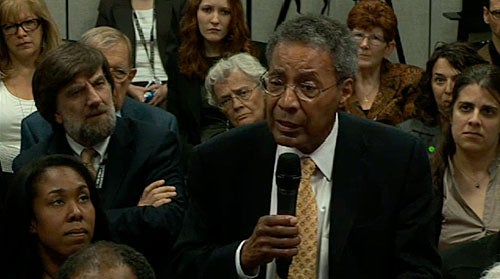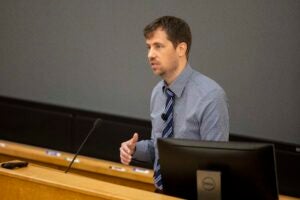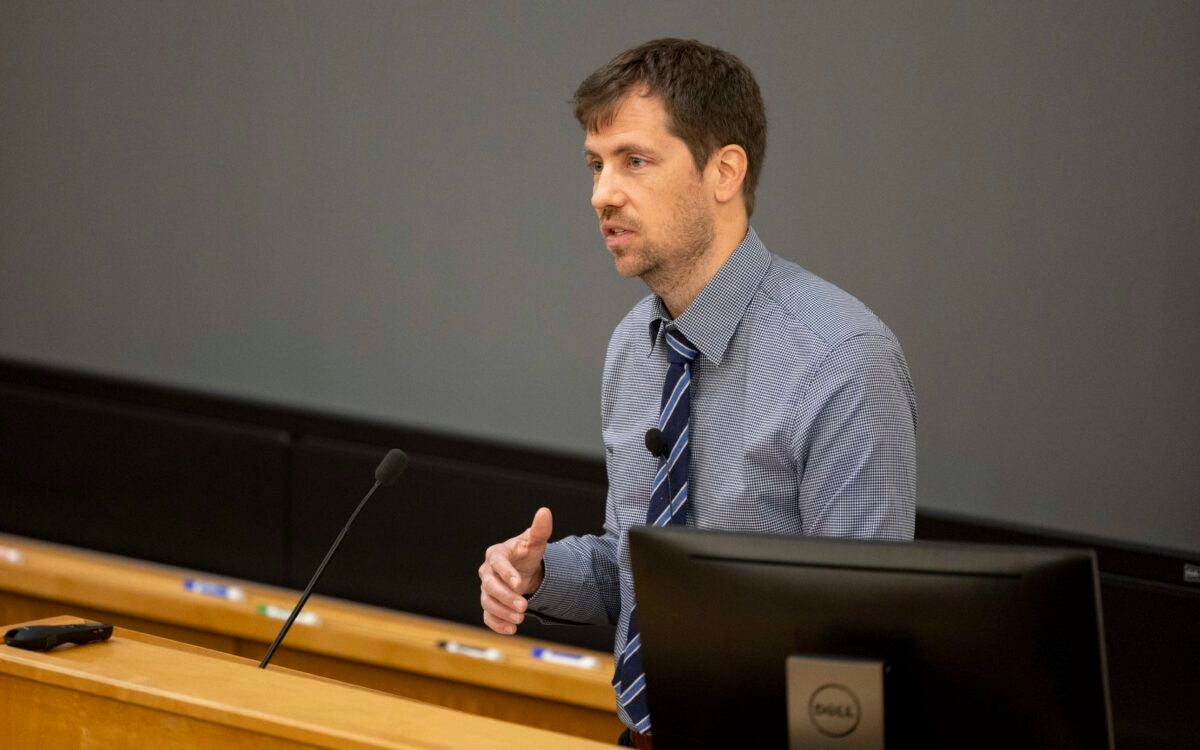
Children’s exposure to violence, which can cause physical, emotional, and psychological harm, is “one of the greatest public safety and public health epidemics of our time,” U.S. Attorney General Eric Holder told the Harvard School of Public Health audience.
Images captured from HSPH webcast
Holder’s mission
AG calls for wider effort to reduce children’s exposure to violence
When U.S. Attorney General Eric Holder uses the word “epidemic” to describe the rise of violence witnessed by children, he is not indulging in hyperbole.
Use of the word is part of his mission to recast the problem of violence seen by or done to kids as a public health issue, one that demands responses from multiple institutions — not just law enforcement — to address both symptoms and prevention.
On May 6 Holder brought this message to The Forum at the Harvard School of Public Health (HSPH) in remarks and a discussion broadcast live via the web and posted as an on-demand webcast.
Children’s exposure to violence, which can cause physical, emotional, and psychological harm, is “one of the greatest public safety and public health epidemics of our time,” Holder told the audience.
Children today are much more likely than adults to be exposed to violence and crime, from bullying at school, seeing parents strike each other, or experiencing a knife or gunfight, he said.
Whether a child is a victim or a witness, he added, “Violence affects the brain as much as it affects the body and the spirit.”
Research has demonstrated the cumulative effect of violence, Holder continued, citing a Justice Department study that found “a majority of our children — more than 60 percent of them — have been exposed to some type of crime, abuse, or violence.”
According to Holder, these children are more likely to suffer depression or to fail in school; have a greater risk of drug and alcohol abuse as adults; are more likely to develop chronic disease; have difficulty establishing emotional closeness; and are more likely to commit acts of violence.
Violence is not limited by region; it can happen at home, school, in the streets, and on the Internet, Holder said: “We must recognize that children’s exposure to violence is a public health issue and it demands a public health response.”
He said the problem should be addressed “holistically, not just in fragments” by building on existing partnerships among institutions, and he called for training more professionals to work with children exposed to violence, he said.

During the Q&A session, Jay Winsten, the Frank Stanton Center Director for the Center for Health Communication at HSPH, asked Holder about his strategy for turning plans into action.
One response is to cast the problem as one of U.S. security and protection, Holder said. “What we’re doing here today is just as important as what we did on Sunday,” he said, referring to the killing of Osama bin Laden. “We have to protect the American people. It’s not a coincidence that we see the greatest amount of violence in areas with the greatest amount of social dysfunction.”
Winsten also speculated about changing social norms, noting that efforts to combat drunk driving led to the notion of a “designated driver.” What might be the counterpart in combating behavior around bullying?
Holder responded with a personal story about how his own daughter, now 17, was bullied at school in the fifthand sixth grades but never told him about it. “It brought tears to my eyes to hear her describe what she experienced,” he said.
Alvin Poussaint, professor of psychiatry, associate dean for student affairs at Harvard Medical School, and a long-time crusader on children’s issues, warned about the anger and rage that underlies bullying. “I think we have to focus on that anger,” he said.
Since many programs operate at the state level, asked Harvard Law School Professor Ronald Sullivan, how can federal authorities create the political will to institute change?
Through grant making, Holder replied. “You’d be surprised at the number of cities and neighborhoods that want to try these things.”
Asked by Barbara Ferrer, executive director of the Boston Public Health Commission, about accomplishments in getting to the root cause of violence, Holder acknowledged, “The Justice Department can’t do it alone.”
Crime levels decrease with education achieved, he noted, adding, “Some of our best crime fighters are teachers.”




